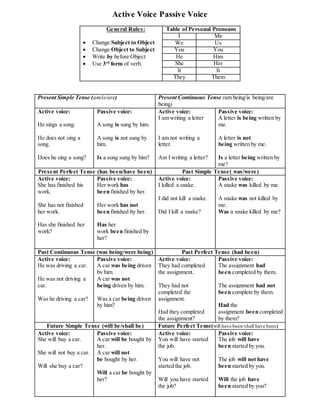Active voice passive voice
- 1. Active Voice Passive Voice General Rules: ï‚· Change Subject to Object ï‚· Change Object to Subject ï‚· Write by before Object ï‚· Use 3rd form of verb. Table of Personal Pronouns I Me We Us You You He Him She Her It It They Them Present Simple Tense (am/is/are) Present Continuous Tense (am being/is being/are being) Active voice: He sings a song. He does not sing a song. Does he sing a song? Passive voice: A song is sung by him. A song is not sung by him. Is a song sung by him? Active voice: I am writing a letter I am not writing a letter. Am I writing a letter? Passive voice: A letter is being written by me. A letter is not being written by me. Is a letter being written by me? Present Perfect Tense (has been/have been) Past Simple Tense( was/were) Active voice: She has finished his work. She has not finished her work. Has she finished her work? Passive voice: Her work has been finished by her. Her work has not been finished by her. Has her work been finished by her? Active voice: I killed a snake. I did not kill a snake. Did I kill a snake? Passive voice: A snake was killed by me. A snake was not killed by me. Was a snake killed by me? Past Continuous Tense (was being/were being) Past Perfect Tense (had been) Active voice: He was driving a car. He was not driving a car. Was he driving a car? Passive voice: A car was being driven by him. A car was not being driven by him. Was a car being driven by him? Active voice: They had completed the assignment. They had not completed the assignment. Had they completed the assignment? Passive voice: The assignment had been completed by them. The assignment had not been complete by them. Had the assignment been completed by them? Future Simple Tense (will be/shall be) Future Perfect Tense(will have been/shall have been) Active voice: She will buy a car. She will not buy a car. Will she buy a car? Passive voice: A car will be bought by her. A car will not be bought by her. Will a car be bought by her? Active voice: You will have started the job. You will have not started the job. Will you have started the job? Passive voice: The job will have been started by you. The job will not have been started by you. Will the job have been started by you?
